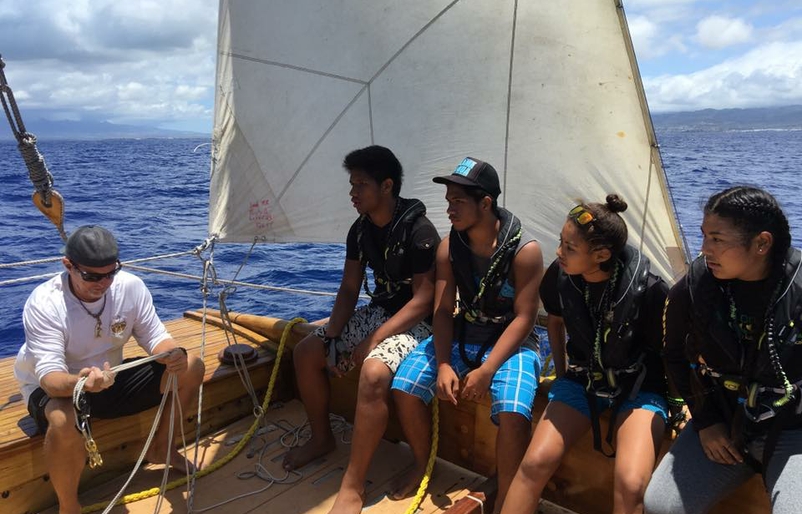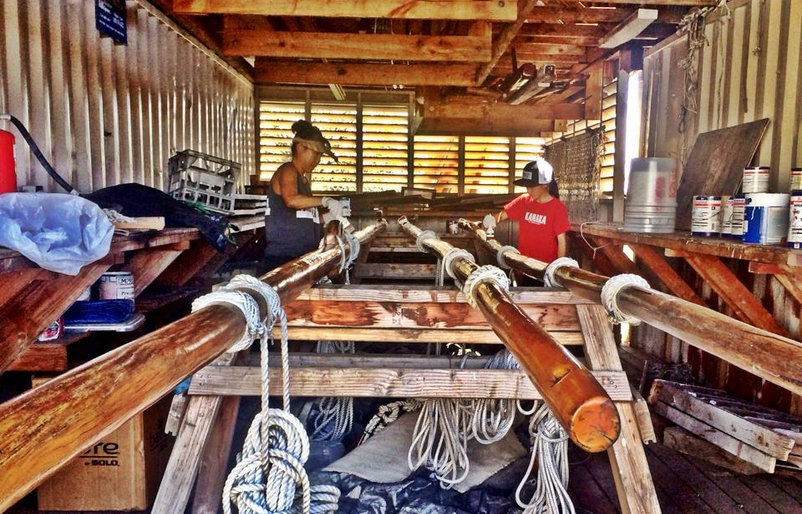In June 2017, some 50,000 Hawai‘i residents and visitors gathered at O‘ahu’s Magic Island, as well as offshore on surfboards, kayaks and boats, to greet the voyaging canoe Hōkūle‘a, whose crew had sailed 42,000 nautical miles over four years to “weave a lei of hope” around the world.
The Mālama Honua (to care for our Earth) Worldwide Voyage sponsored by Hawaiian Airlines was an exceptional feat by brave and skilled crewmembers who sailed using only Polynesian wayfinding techniques. But the voyage could not have succeeded without the kōkua of passionate volunteers with the nonprofit The Friends of Hokule‘a and Hawai‘iloa.
The Friends was established in 1996 by master canoe builder, Wright Bowman Jr., who was concerned that the art of canoe building would be lost. By building, maintaining, and restoring canoes, the Friends hope to improve understanding and appreciation for this unique Hawaiian heritage, not only for Hawaiians but for anyone interested in learning.

We recently talked story with the Friends, one of 14 local nonprofit partners of our HawaiianMiles Charity Program, whose operations have also been disrupted by the COVID-19 pandemic. In preparation for Giving Tuesday, we are highlighting our hardworking charities and inviting our HawaiianMiles members to join us in supporting them in a special promotion.
For every mile donated on Dec. 1, we will match up to 100,000 HawaiianMiles to each recipient organization – on top of 500,000 miles we pledge to match annually.
How has the COVID-19 pandemic impacted the work and operations of the Friends?
Like most if not all of the population here in Hawai’i, the impact has been moderate to severe. Moderate in that our volunteers have not been infected (to date) by the virus because they adhere to the safe practices that all of our citizenries have been asked to abide by. But also severe in that because of those very practices, and the protocols put in place by our state (for our own safety), we are for the most part unable to access the canoes within our care. It is not the fault of anyone – it is a result of a virus that has changed the way we must think, act and respond.
Funding, too, is an obvious victim of the pandemic. Corporations, as well as charity-minded individuals, have suffered economically. They must choose between what keeps their companies and/or family afloat and/or give to well-meaning organizations to which they have supported for years. To those who have given us that support over the years, please know that we are most grateful.
What are some projects currently underway to support the Friends’ mission?
We have multiple projects underway simultaneously, both big and small.
Our largest is the voyaging canoe Hawai‘iloa, a 58-foot sailing canoe built entirely out of natural materials, including two hollowed-out logs, a gift of native Alaskans, which serves as its hulls. Launched in 1993, Hawai’iloa was a project of both the Bishop Museum and the Polynesian Voyaging Society, and was the second vessel to be built and sailed to Tahiti and back in the traditional manner of Hawai’i’s ancient voyagers. Owned by the Bishop Museum, the Friends accepted responsibility for the maintenance, upkeep, and care of this living cultural artifact upon completion of its maiden voyages.

Our smaller projects consist of a collection of outrigger canoes ranging in size from 12 to 40 feet in length. Many of these canoes are over a century old – the centerpiece being a canoe once belonging to Prince Jonah Kūhiō Kalaniana‘ole. The smaller size of the outriggers allows us to share canoe building skills and traditions with those interested in the craft. More importantly, within the educational system, we have had charter school students take part in the refurbishing of very old and worn canoes, and make them new again. The idea then is to keep these traditions alive, lest they be lost.
What is the biggest challenge the Friends are facing today?
Interestingly enough, the challenges we face are the same as what we all are facing. The latest is the ongoing pandemic. Not being allowed as such to access the vessels and projects because of COVID protocols. “Cluster” is the new moniker for the work crew. Fundraising events canceled, and it goes on. But perhaps it was inevitable because our environment has been suffering the same for years.
In our search for replacement materials for our projects, we face the difficult decision as to whether we can replace old parts of the voyaging canoe Hawai’iloa, which are made of ‘ohia, for fear of spreading rapid ʻōhiʻa death. Or, parts made of koa because of diseases as rust and wood-rotting fungi.
Fundraising has of course suffered accordingly due to the pandemic. Annual events to raise monies have all but been canceled, and a plethora of fundraisers compete daily within a virtual landscape.
How can the community support the efforts of the Friends?
Your miles, should you decide to donate to the Friends of Hokule’a and Hawai’iloa, will allow us to travel interisland to search for environmentally safe materials for canoe building, maintenance, and repair. It will also allow for outreach into our communities and schools to share in the traditions of our ancestors.
We are also planning to take Hawai’iloa to Alaska as an expression of gratitude for their gift of the Sitka Spruce logs used for the making of the hulls. Donated miles would let us switch out our crews at selected ports of call so as to not have them away from their family and jobs for an extended period of time.
However, mindful support would be in the form of taking action to care for yourself and come to a deeper understanding of the changes in our lives brought on by COVID. Apply it then, to you, your family, and your community, and relate it to our environment, which has suffered the same fate for years as a result of viruses and disease. The fate of one tree, one forest, one island, and one Earth is in our hands.
